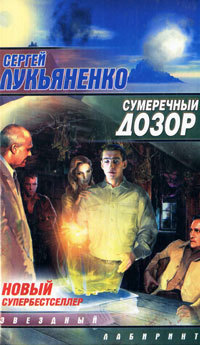books
Books like Twilight Watch
Twilight Watch
I really wanted to finish this before 2008 ended, but travel, a hectic schedule and a new mini-PC conspired against me. Ah well, such is life.This world is one that is riddled with possibilities. Even though Lukyanenko has been pretty single-minded in his themes throughout the trilogy, there's a lot to work with here. We have two distinct groups of Others, the Light and the Dark, with different character classes, powers, abilities, levels and ambitions. If anyone wanted to write fan fiction or even a role-playing game based on the world of the Night Watch series, they would be able to let their imaginations roam free. It's an open-ended universe, rife with possibility.So why isn't it is popular worldwide as, say, Harry Potter? Probably because it's more grown-up than the Potter series, and is therefore less attractive.Don't get me wrong - I liked Harry Potter. But for all its merits, it deals with human-level issues: friendship, family, duty, loyalty. And those are all well and good, and many a great story has been told from those elements. The Night Watch series, on the other hand, deals with harder, less everyday topics, such as the nature of freedom, and the fundamental differences between Good and Evil, if there is any difference at all. The themes in these books are headier, and it's not as easy to look at a Light Other like Anton Gorodetsky and say, "I want to be like him." It's also hard to look at a Dark Other like the vampire Kostya and say, "Oooh, I hate him."This is because these characters are, more or less, human. The problem with humans is that their motives aren't always clear, and Lukyanenko doesn't tell us everything we need to know to judge them properly. With the exception of Anton, who is a first-person narrator, we don't get into their heads, and so can't completely understand why they do what they do.In any case, it's an enjoyable series, and this is - as far as I know - the end of it, even though it doesn't need to be.In this volume we are introduced to some new players, some grand plots and some terrible secrets. There is an Other out there who has knowledge that everyone thought was merely a myth: how to turn an ordinary human into an Other. The ramifications of such power are immense - there are few Others in the world as it is, and they hardly get along. To create new Others at will would mean chaos, death and destruction. All the Others' forces are sent out to find this mysterious person. Trhe Night Watch, the Day Watch and the Inquisition are in search of the impossible.Anton Gorodetsky, of course, is on the front lines of this, searching for leads in a Moscow apartment complex. What he finds there isn't quite the secret he thought it was, but it is something he never expected.In the second story of the volume, he meets an ancient witch, Arina, who may have single-handedly destroyed the Soviet Union's potential for greatness. In his search to defeat her, he learns the true nature of the Others, what gives them their power and how they truly interact with the world around them.And in the third story, the Fuaran has been found - the mythological text with the spell to convert humans to Others - and it will be used in a truly novel manner. But the Other behind the plan that could tip the world into supernatural anarchy is the last person Anton would have ever expected....As with the other volumes, this one blurs the line between good and evil. It tells us what we already know, but don't really want to admit: that good people can do evil things - start a bloody revolution, for example, or try to brainwash thousands of people - and that evil people can do good - save children from wolves, or avert a chaotic and terrible future. People do things for reasons that are sometimes known only to themselves, not out of a higher allegiance to the abstract concepts of "good" and "evil," but for reasons that are intensely personal.It is something to be remembered. We have a habit of idolizing and demonising people in this world, elevating them to paragons of virtue or sin, and ascribing motives to them that we think they acted by. But that doesn't work. Even to the end, Anton believes he knows why the holder of the Fuaran wants to convert people into Others - to raise an army and control the world - but he's so very, very wrong. The true reason is much more personal and, oddly, much more human than that.That is probably the best lesson to be taken from these books. "Good" and "Evil" are tags that we affix to people because it saves us the effort of thinking about them. Behind every act, however, is a personal reason that defies such simplistic labeling. Every saint, every monster, is only human. Just like us. I don't know if knowing that makes the world better or worse, but it at least makes it a little more familiar.

Filter by:
Cross-category suggestions
Filter by:
Filter by:
Filter by:
Filter by:
Filter by:
Filter by:
Filter by:
Filter by: